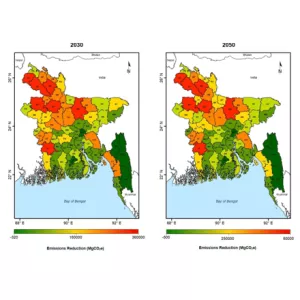Bangladesh could largely reduce greenhouse gas emissions from agriculture while increasing efficiency in production
A number of readily-available farming methods could allow Bangladesh’s agriculture sector to decrease its greenhouse gas emissions while increasing productivity, according to a new study by the International Maize and Wheat Improvement Center (CIMMYT) and partners. The study, published in Science of the Total Environment, measured the country’s emissions due to agriculture, and identified and analyzed potential mitigation measures in

Bangladesh could largely reduce greenhouse gas emissions from agriculture while increasing efficiency in production
A number of readily-available farming methods could allow Bangladesh’s agriculture sector to decrease its greenhouse gas emissions while increasing productivity, according to a new study by the International Maize and Wheat Improvement Center (CIMMYT) and partners.
The study, published in Science of the Total Environment, measured the country’s emissions due to agriculture, and identified and analyzed potential mitigation measures in crop and livestock farming. Pursuing these tactics could be a win-win for farmers and the climate, and the country’s government should encourage their adoption, the research suggests.

